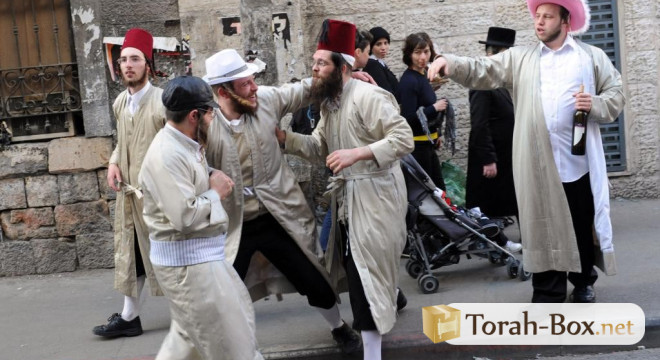
Purim
Insights In The Midst Of Chaos
Some fifty years ago, in a domain known as the science of Chaos, meteorologist Edward Lawrence put together a climate "behavior" model which led to an incredible breakthrough.
Lawrence discovered that meteorological forecasts were extremely sensitive to unexpected minute variations and changes concerning the time and place of natural phenomena. He constructed a model operating according to certain laws and discovered, in so doing, that the fulfillment of a weather forecast could be transformed at the last minute by something as arbitrary as the movement of a butterfly's wings.
Based on his research and results, Lawrence established a theory called the Effect of the Butterfly. This phenomenon is best understood in the form of a question that may find surrealistic and far-fetched: "Can the fluttering of a butterfly's wings in Brazil ignite a chain of events that will eventually provoke a tornado in Texas?" The answer is...Yes!
The Effect of the Butterfly complies almost perfectly with the Scroll of Esther, whose events occur within a story knitted by a series of events, which seem arbitrary,
disconnected, and chaotic and ruled by chance alone. At first, as the scroll begins to unfold, it seems that there is no logical development between one event and another. It is only after the scroll is completely unfolded, that we realize, as in the chaotic manifestations of nature, that each element, almost absurd in itself, (such as the fluttering wings of a butterfly), was thoroughly planned by the Author of the Megillah.
Queen Vashti's illogical refusal to strip before the nobles of the Kingdom ignites a series of events that eventually lead to the fall of Haman.
But before reaching its climax, the scroll offers a drama, rich in details, color, and confusion. Asked by the King to define the honors to be bestowed upon a man of merit, Haman advises the King to glorify the candidate by mounting him on a splendid white horse, wearing the King's robes.
Unaware that the King's chosen one is not he, but Mordechai, his worst enemy, Haman is overjoyed. A genial element of theatrical surprise!
A sort of insomnia perturbs the King's sleep. The King asks his advisor for the book of chronicles of the Kingdom - the political annals of the Royal court. He opens the book at random and falls upon the page describing the positive role played out by Mordechai during an old intrigue to complot against the King's life. This sudden irruption of the past opens a process that will quickly bring the fall of Haman.
Later in the text, when Haman, thinking he will be the guest of honor of King Achashverosh and Queen Esther he goes to the palace for a second tête-à-tête with the royal couple, Esther, who can hardly mumble a few words, ends up making a double revelation. She unveils the intentions of Haman to exterminate her people as well as her Jewish identity, so far concealed from the King.
The enraged King exits the room to breathe a little fresh air and upon his return, he finds Haman, lying on the Queen's bed (actually, imploring grace) “You are going to rape the Queen in my presence and in my palace”?
While other prophecies reveal divine intention via the words and actions of a chosen prophet way ahead of their concrete fulfillment, the story of the Megillah unfolds in the form of a story that happens in real time, without its protagonists' awareness.
As in our own current history, broadcasted daily in the media, we ignore the outcome of political moves, social intrigues, and wars. In other words, we don’t have a clue where all this drama is leading to. Both individually as well as collectively, our lives transpire in an atmosphere of chaos, where more often than not, our plans are altered, despite our efforts to draw out schedules and keep deadlines.
We find ourselves being continuously distracted by a series of unpredictable events which appear in different disguises such as sudden future flashes, sleepless nights, blocked sinks, traffic jams, canceled meetings, computer bugs, and God spare us, terrorist attacks.
Like in the Megillah or the meteorological forecast, our linear reality becomes chaotic when unforeseen events happen. And they happen all the time.
In the apparent chaos of our existence, which is nothing else but the unfolding scroll of the history of humanity, we are unable to foresee the end. Some interpret the signs as the upcoming final redemption, leading to peace; others fear a nuclear war that will wipe all the planet. All we are able to see is the continuous chaos wildly taking over our lives, our nation, and our world.
But at Purim, after a few drinks, we are elevated above the predicament of this unbearable duality. We are able to touch a higher consciousness, above logic and reason, to the point of being unable to distinguish the difference between Mordechai and Haman. In this sphere, where good and evil, war or peace, right and wrong are all part of the same divine plan, everything can be altered by something as insignificant as the fluttering of a butterfly's wings or a King's insomnia.
Gabriella Karen
Torah-Box.net Account
To access the entire Torah-Box.net website, sign up for free in less than a minute.
Weekly Parsha
 Candle Lighting - New York
Candle Lighting - New York
Friday January 2nd, 2026 at 16:22 *Shabbat ends at 17:27 *
change my location
* Times given as an indication, check the times of your community











